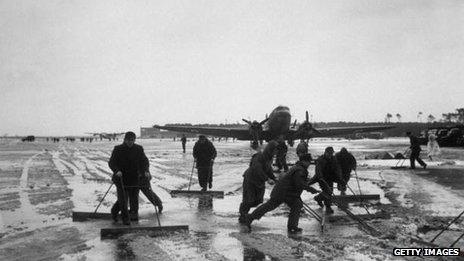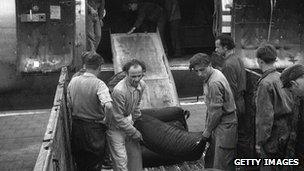Funding boost to recall Berlin airlift
- Published

German workers cleared snow throughout the night at an airfield, as the Berlin Airlift was temporarily delayed by bad weather
A project to remember the work of the armed services across East Anglia who were involved in the 1948-49 Berlin Airlift has received a £49,500 grant from the Heritage Lottery.
Charity Legasee is using the money to help document the experiences of people involved in the airlift.
The airlift provided a lifeline for west Berlin after Soviet forces which surrounded the capital, closed all land corridors.
The project will culminate in an exhibition at the Norfolk and Suffolk Aviation Museum in Flixton, Suffolk, to mark the 65th anniversary of the airlift.
The exhibition will open to the public in August 2013.

The first load of coal was delivered by air as part of the Berlin airlift at Tempelhof Airport in 1948
In the East of England airfields providing support to the airlift included RAF Oakington and RAF Waterbeach in Cambridgeshire and RAF Honington in Suffolk.
Working with Legasee's professional volunteers, young people will learn about the techniques of interviewing, filming, editing and transcribing through the capturing and archiving of filmed oral history.
They will gain a deeper insight into the importance of this humanitarian airlift from the perspective of the British veterans who were part of it.
Commenting on the award, Legasee Trustee Martin Bisiker said the organisation was "confident that finally this incredible story can be captured, the key role that British veterans played be recognised and that young people will be part of it".
Robyn Llewellyn, head of Heritage Lottery Fund (HLF) East of England, said: "HLF are delighted to support Legasee Educational Trust in marking this significant part of East Anglian history and securing the fascinating stories of the veterans that were a part of it."
Ian Hancock, chairman of the Norfolk and Suffolk Aviation Museum, said: "Our exhibition will bring together artefacts and the memories of people to demonstrate what the airlift was all about.
"We will then allocate space for a permanent display. We think it is very important as a museum to preserve its history.
"This was a humanitarian mission of enormous proportions."
Colin Cottle, who lives near Upminster in Essex, served in the Royal Signals in the British zone in west Germany.
His task was to keep open communcation links between the airfields in west Germany and those in west Berlin.
"My job was to keep the telephone and teleprinter (an early form of fax machine) working to get weather reports back from the airport in Berlin. There was a very bad winter in 1948," he said.
Mr Cottle, who is involved in the British Berlin Airlift Association (BBAA) which is working with the Legasee project, said it was vital to remember the role of the Britain in the airlift.
"It was a wonderful British achievement that we don't often hear about," he said.
People involved in the Berlin Airlift can contact the Legasee project via its website.